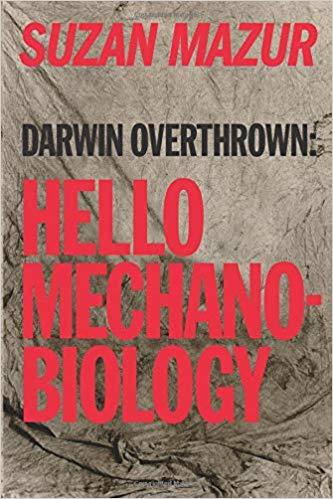Michael J. Behe's Blog, page 450
July 27, 2019
Forty years ago, Douglas Hofstadter was sure a materialist explanation of the brain would work…

His book, Gödel, Escher, Bach: An Eternal Golden Braid, was intended to demonstrate that. So what happened?
AI language-processing neural networks have no understanding of context or meaning with respect to the symbols they manipulate, so it’s hard to say if we are any closer to an AI behaving with human-like intelligence. While Tegmark can’t rule it out, he doubts that we will achieve what he considers human-level artificial general intelligence (AGI) any time in the foreseeable future (i.e., the ability for an AI to generally accomplish any task that humans can at least as well as humans). And AGI is what Hofstadter sees as the Holy Grail of AI.
There have been no indications that AI programs will ever break free of these constraints, and further, no demonstration that humans are rule-governed in the way that Hofstadter posits. Indeed, the view that human consciousness is something unique is the most tenable philosophical position unless we learn definitively otherwise.
There is, quite simply, no mechanical explanation of how the human mind has emerged from brawling chimpanzees over the course of millions of years of evolution.
Walter Myers III, “We went back to visit Gödel, Escher, and Bach…” at Mind Matters News
That keeps happening with materialist theories. We thought their hat had way more rabbits.
Further reading on theories of the human mind:
Panpsychism: You are conscious but so is your coffee mug Materialists have a solution to the problem of consciousness, and it may startle you
How can consciousness be a material thing? Maybe it can’t. But materialist philosophers face starkly limited choices in how to view consciousness
and
Four researchers whose work sheds light on the reality of the mind. The brain can be cut in half, but the intellect and will cannot, says Michael Egnor. The intellect and will are metaphysically simple.
Copyright © 2019 Uncommon Descent . This Feed is for personal non-commercial use only. If you are not reading this material in your news aggregator, the site you are looking at is guilty of copyright infringement UNLESS EXPLICIT PERMISSION OTHERWISE HAS BEEN GIVEN. Please contact legal@uncommondescent.com so we can take legal action immediately.
Plugin by Taragana
Researcher: Hidden variations enable rapid evolution
 DNA/CCOPublic Domain
DNA/CCOPublic DomainIn the course of describing an experiment on cryptic variation in E coli, Andreas Wagner offers
Genetic variation—that is, accumulated mutations in the DNA—is the fuel for all evolutionary change: the more genetic variation, the faster evolution works and the more possibilities for novel adaptive solutions.
But one kind of genetic variation—hidden, or “cryptic,” variation— doesn’t alter the appearance or behavior of an organism in its usual environment.
“It’s an underappreciated kind of genetic variation,” says corresponding author Andreas Wagner, an evolutionary biologist at the University of Zurich and external professor at the Santa Fe Institute, “and it plays an important role in evolution.”…
In the wild, cryptic variation helps fish adapt to life in caves. In the lab, cryptic variation might help a biomolecule bind a new receptor. “Our work can help develop new directed evolution strategies to find innovative biomolecules for biotechnological and medical applications,” says Zheng.
Like a fat savings account, cryptic variation is a store of variation that becomes available in an emergency to fuel rapid evolutionary change critical to the survival of a lineage and useful for molecular biologists.
Santa Fe Institute, “Hidden genetic variations power evolutionary leaps” at Phys.org
It sounds a lot like this “fat savings account” of potential variations in evolution is preprogrammed, which would certainly make sense from a design perspective. Something like Lee Spetner’s approach in The Evolution Revolution. Or, as a friend says, it’s “evolutionary teleonomy.”
Not that the people at Santa Fe mention it.
See also: Evolutionary Teleonomy: Support From Mainstream Evolutionary Biologists (Jonathan Bartlett)
and
The Dangers Of Bad Paradigms And The Need For Evolutionary Teleonomy (Jonathan Bartlett)
Follow UD News at Twitter!
Copyright © 2019 Uncommon Descent . This Feed is for personal non-commercial use only. If you are not reading this material in your news aggregator, the site you are looking at is guilty of copyright infringement UNLESS EXPLICIT PERMISSION OTHERWISE HAS BEEN GIVEN. Please contact legal@uncommondescent.com so we can take legal action immediately.
Plugin by Taragana
Data detective identifies hundreds of correction- or retraction-worthy papers
In the midst of all the sham, scam, and flimflam in journals today, here’s a story of a real-life data detective who makes a difference:
By day, [John] Carlisle is an anaesthetist working for England’s National Health Service in the seaside town of Torquay. But in his spare time, he roots around the scientific record for suspect data in clinical research. Over the past decade, his sleuthing has included trials used to investigate a wide range of health issues, from the benefits of specific diets to guidelines for hospital treatment. It has led to hundreds of papers being retracted and corrected, because of both misconduct and mistakes. And it has helped to end the careers of some large-scale fakers: of the six scientists worldwide with the most retractions, three were brought down using variants of Carlisle’s data analyses.
David Adam, “How a data detective exposed suspicious medical trials” at Nature
He focuses on medicine because bad data can put lives at risk.
See also: Retraction Watch wonders: How did THIS nonsense end up in a peer-reviewed journal?
Follow UD News at Twitter!
Copyright © 2019 Uncommon Descent . This Feed is for personal non-commercial use only. If you are not reading this material in your news aggregator, the site you are looking at is guilty of copyright infringement UNLESS EXPLICIT PERMISSION OTHERWISE HAS BEEN GIVEN. Please contact legal@uncommondescent.com so we can take legal action immediately.
Plugin by Taragana
Darwinian Jerry Coyne makes a good point about the social science hoaxes
And reveals an uncomfortable fact about the response:
My own take on this is that while the hoax was duplicitous and deliberately so, it did expose the rot in some parts of the humanities in a way that would have been hard to do by other means. I can write critiques of papers on feminist glaciology or the othering, gendering, and fat-shaming of urban squirrels, but these paper-by-paper critiques showed only that an occasional howler slips through the cracks. (These papers are, however, seen as serious scholarship.) It’s another thing entirely to confect bogus papers that align with Regressive Leftist ideology, and then get these risible “studies” published in decent journals. (One remembers Alan Sokal’s famous Social Text hoax.) In other words, Pluckrose et al. got a lot more attention than I did. And that’s fine. For they did, to my mind, expose a creeping rot in the floorboards of academic humanities, which has becoming increasingly solipsistic, tendentious, propagandistic, and devoid of critical thinking but besotted with intersectionalist ideology. Were it up to me, I would not have punished Peter.
But academics went wild with rage, for, unable to stand the idea that the humanities has been infected with tendentious pomo junk scholarship, they performed what animal behaviorists call “displacement behavior”: they ignored the message and tried to kill the messengers. And you’ll see some of that in a discussion in the Chronicle of Higher Education about the meaning of the Grievance Studies hoaxes. There are seven pieces involving eight scholars on both sides of the issue.
Jerry Coyne, “The “grievance studies” hoax: a forum at the Chronicle of Higher Education” at Why Evolution Is True (blog)
Evolutionary biologist Jerry Coyne is the author of Why Evolution Is True (book).
The distinction is that low-quality papers might happen to fall through the cracks now and then and a cherry picker could gin up an indictment of a whole field unjustly. BUT when a number of hoax papers get accepted by various journals, that points to deeper systemic rot. Especially when the social science profs are enraged rather than ashamed.
It has a lot to do with the absolute, measurable decline in scholarship overall. And it is starting to infect science.
See also: Portland U prof who hoaxed social science journals to prove a point is punished The rap is “research misconduct,” of all things. Oh and get this: “An academic journal is continuing to sell a viral article on “rape culture” and “queer performativity” in Portland dog parks despite expressing concerns about the veracity of the research. Veracity? It was a genuine hoax, that’s what kind of veracity it had.
Follow UD News at Twitter!
Copyright © 2019 Uncommon Descent . This Feed is for personal non-commercial use only. If you are not reading this material in your news aggregator, the site you are looking at is guilty of copyright infringement UNLESS EXPLICIT PERMISSION OTHERWISE HAS BEEN GIVEN. Please contact legal@uncommondescent.com so we can take legal action immediately.
Plugin by Taragana
“If it fits into a nutshell . . .”: on, the error of demanding arbitrary, rhetorically loaded brevity
I noticed that the objection of dismissal on length (without substantial consideration) has come up here at UD yet again. I think it appropriate to note its fallacious character where considerable reflection is required. (And BTW, a quote from a serious source is a legitimate approach as I will shortly exemplify.)
Accordingly, let me headline a comment I just made in the Egnor vs a materialist neuroscientist thread:
KF, 15: >>[I]f a philosophical claim on any serious matter fits neatly into a nutshell, it belongs there. There is always an issue of substantial exposition, cross-check against material facts, establishing credible coherence and comparative, balanced explanatory power. This is not a business of 140 or 280 character tweets or rhetorically loaded sloganeering. We need substance, and that’s why a serious phil work may take 50 pp to establish a pivotal point. Short summaries and headlines may indeed summarise, promote and link, but they do not generally speaking establish a substantial matter. (And BTW, that’s one of the few things that that notorious tabloid Daily Mail is exemplary on: header, bullet points, exposition.) KF
PS: In The Laws, Bk X, Plato speaks eloquently to the demand for arbitrary brevity:
Ath. At Athens there are tales preserved in writing which the virtue of your state, as I am informed, refuses to admit. They speak of the Gods in prose as well as verse, and the oldest of them tell of the origin of the heavens and of the world, and not far from the beginning of their story they proceed to narrate the birth of the Gods, and how after they were born they behaved to one another. Whether these stories have in other ways a good or a bad influence, I should not like to be severe upon them, because they are ancient; but, looking at them with reference to the duties of children to their parents, I cannot praise them, or think that they are useful, or at all true. Of the words of the ancients I have nothing more to say; and I should wish to say of them only what is pleasing to the Gods. But as to our younger generation and their wisdom, I cannot let them off when they do mischief. For do but mark the effect of their words: when you and I argue for the existence of the Gods, and produce the sun, moon, stars, and earth, claiming for them a divine being, if we would listen to the aforesaid philosophers we should say that they are earth and stones only, which can have no care at all of human affairs, and that all religion is a cooking up of words and a make-believe.Cle. One such teacher, O Stranger, would be bad enough, and you imply that there are many of them, which is worse.
Ath. Well, then; what shall we say or do?-Shall we assume that some one is accusing us among unholy men, who are trying to escape from the effect of our legislation; and that they say of us-How dreadful that you should legislate on the supposition that there are Gods! Shall we make a defence of ourselves? or shall we leave them and return to our laws, lest the prelude should become longer than the law? For the discourse will certainly extend to great length, if we are to treat the impiously disposed as they desire, partly demonstrating to them at some length the things of which they demand an explanation, partly making them afraid or dissatisfied, and then proceed to the requisite enactments.
Cle. Yes, Stranger; but then how often have we repeated already that on the present occasion there is no reason why brevity should be preferred to length; who is “at our heels”?-as the saying goes, and it would be paltry and ridiculous to prefer the shorter to the better. It is a matter of no small consequence, in some way or other to prove that there are Gods, and that they are good, and regard justice more than men do. The demonstration of this would be the best and noblest prelude of all our laws. And therefore, without impatience, and without hurry, let us unreservedly consider the whole matter, summoning up all the power of persuasion which we possess. >>
Food for thought as we contemplate the need for comparative difficulties analysis. END
Copyright © 2019 Uncommon Descent . This Feed is for personal non-commercial use only. If you are not reading this material in your news aggregator, the site you are looking at is guilty of copyright infringement UNLESS EXPLICIT PERMISSION OTHERWISE HAS BEEN GIVEN. Please contact legal@uncommondescent.com so we can take legal action immediately.
Plugin by Taragana
July 26, 2019
Portland U prof who hoaxed social science journals to prove a point is punished
Remember the team of hoaxers who, last year, showed how ridiculous social science journals are? Well, the axe fell on their prof leader, Peter Boghossian, at Portland U:
he professor who duped academic journals into publishing bogus articles has now been banned by Portland State University from conducting any and all university-sponsored research and threatened with an administrative review of his “questionable ethical behavior.”
Peter Boghossian made headlines in 2018 after he and two other researchers set out to prove a point about the integrity of “peer-reviewed” academic publications by submitting several fake studies including an analysis of “dog rape culture,” and a piece that was simply a section of Hitler’s Mein Kampf reworked to include a smattering of academic buzzwords.
After seven of the team’s fake submissions were accepted and published by esteemed academic journals, a Campus Reforminvestigation led the publisher of the infamous Portland “dog park rape culture” article to question the origins of the submission. This ultimately revealed the article as part of a larger effort by Boghossian and his team to demonstrate the inadequacies of these publications. Celine Ryan, “PSU punishes prof who duped academic journal with hoax ‘dog rape’ article” at Campus Reform
The rap is “research misconduct,” of all things.
Oh and get this: “An academic journal is continuing to sell a viral article on “rape culture” and “queer performativity” in Portland dog parks despite expressing concerns about the veracity of the research. Veracity? It was a genuine hoax, that’s what kind of veracity it had.
Now to the important item of business: What are we going to do about all the boobs who think that “social science” isn’t really science?
See also: Jerry Coyne discovers the lack of intellectual freedom on campus
Social Science Hoax Papers: Putting A Respectable Face On Persecuting The Hoaxers
Embattled “Social Sciences Hoax” Prof Is Not A Hero, He’s A Canary
Social Science Hoaxer’s Job At Risk For Revealing “Bias”
Sokal hoaxes strike social science again
Exposing gender studies as a Sokal hoax
Social Science Hoax Papers Is One Of RealClearScience’s Top Junk Science Stories Of 2018
and
Alan Sokal, Buy Yourself A Latte: “Star Wars” Biology Paper Accepted
Follow UD News at Twitter!
Copyright © 2019 Uncommon Descent . This Feed is for personal non-commercial use only. If you are not reading this material in your news aggregator, the site you are looking at is guilty of copyright infringement UNLESS EXPLICIT PERMISSION OTHERWISE HAS BEEN GIVEN. Please contact legal@uncommondescent.com so we can take legal action immediately.
Plugin by Taragana
Researchers: Photosynthesis may be a billion years older than thought … But WAIT!
 Leaf at work/ © Korn V., Adobe Stock
Leaf at work/ © Korn V., Adobe Stock From ScienceDaily:
The finding could mean the evolution of photosynthesis needs a rethink, turning traditional ideas on their head. …
Plants, algae, and some bacteria today perform ‘oxygenic’ photosynthesis, which splits water into oxygen and hydrogen to power the process, releasing oxygen as a waste product.
Some bacteria instead perform ‘anoxygenic’ photosynthesis, a version that uses molecules other than water to power the process and does not release oxygen.
Scientists have always assumed that anoxygenic photosynthesis is more ‘primitive’, and that oxygenic photosynthesis evolved from it. Under this view, anoxygenic photosynthesis emerged about 3.5 billion years ago and oxygenic photosynthesis evolved a billion years later.
However, by analysing structures inside an ancient type of bacteria, Imperial College London researchers have suggested that a key step in oxygenic photosynthesis may have already been possible a billion years before commonly thought.
The new research is published in the journal Trends in Plant Science.
Lead author of the study, Dr Tanai Cardona from the Department of Life Sciences at Imperial, said: “We’re beginning to see that much of the established story about the evolution of photosynthesis is not supported by the real data we obtain about the structure and functioning of early bacterial photosynthesis systems.”
The bacteria they studied, Heliobacterium modesticaldum, is found around hot springs, soils and waterlogged fields, where it performs anoxygenic photosynthesis. It is very distantly related to cyanobacteria, the main bacteria that performs oxygenic photosynthesis today.
It is so distantly related that it last had a ‘common ancestor’ with cyanobacteria billions of years ago. This means that any traits the two bacteria share are likely to also have been present in the ancient bacteria that gave rise to them both.
By analysing the structures that both H. modesticaldum and modern cyanobacteria use to perform their different types of photosynthesis, Dr Cardona found striking similarities.
Both structures contain a site that cyanobacteria and plants exclusively use to split water — the first crucial step in oxygenic photosynthesis.
The evolution of cyanobacteria is usually assumed to also be the first appearance of oxygenic photosynthesis, but the fact that H. modesticaldum contains a similar site means that the building blocks for oxygenic photosynthesis are likely much more ancient than thought, as old as photosynthesis itself, and therefore could have arisen much earlier in Earth’s history.
Dr Cardona also suggests that this might mean oxygenic photosynthesis was not the product of a billion years of evolution from anoxygenic photosynthesis, but could have been a trait that evolved much sooner, if not first.Paper. paywall – Tanai Cardona, A. William Rutherford. Evolution of Photochemical Reaction Centres: More Twists? Trends in Plant Science, 2019; DOI: 10.1016/j.tplants.2019.06.0 More.
Did you get that? “Dr Cardona also suggests that this might mean oxygenic photosynthesis was not the product of a billion years of evolution from anoxygenic photosynthesis, but could have been a trait that evolved much sooner, if not first.” So when did the billions of years of Darwinian evolution that “gradually evolved” photosynthesis happen?
Calling a security guard won’t be much use in this case.
One change some of us have noticed is that people discussing this kind of information/interpretation are much less likely than they used to be to rush to reassure us all of their Darwinian credentials. One can see why there’s less of that now, of course.
See also: Did land plants get started when algae moved into fungi? “Surprisingly, when they are grown together for a long time — around a month — some algal cells enter the fungal cells. Both organisms remain active and healthy in this relationship. ” This is one likely vector but did all plants really need fungi to live on land?
Researchers: Plants Colonized Earth 100 Mya Earlier Than Thought
and
Flowering Plants Pushed Back By A Mere 100 Million Years?
Follow UD News at Twitter!
Copyright © 2019 Uncommon Descent . This Feed is for personal non-commercial use only. If you are not reading this material in your news aggregator, the site you are looking at is guilty of copyright infringement UNLESS EXPLICIT PERMISSION OTHERWISE HAS BEEN GIVEN. Please contact legal@uncommondescent.com so we can take legal action immediately.
Plugin by Taragana
National Science Teachers group calls security over questioning Darwin

Yes, but it’s not the big story:
[Herman] Bouma was to speak on “Darwin and Evolution: Using Historical Critiques and Responses to Address Student Misunderstanding.” Along with the title, he had provided to the NSTA a straightforward summary stating that his talk would address five of the critiques that Darwin received related to his theory of origins, and the responses that Darwin made to those critiques.
Bouma’s emphasis was on the civil dialogue that Darwin fostered in his writings, and the hope that educators today would strive for the same.
His presentation was scheduled for April 14 at 8:00 am. But the night before, something was wrong. Bouma could no longer find the talk on the conference app.
Sarah Chaffee, “National Science Teaching Association Censors Open Inquiry, Stonewalls When Questioned” at Evolution News and Science Today
You can pretty much guess most of the rest:
They told him to pack up. Meanwhile security guards joined the conference officials in turning people away at the door. The witness I spoke to confirmed this: “People were trying to come in and there were people outside the door — then a security guard said basically you need to leave. Herman said, ‘I don’t understand.’ He was told, ‘You have to leave this room.’ They literally were blocking the entrance to get into the room.” Imagine, the major U.S. science teachers group used security guards to stop a scheduled speaker from speaking and to hustle him out of the premises.
Sarah Chaffee, “National Science Teaching Association Censors Open Inquiry, Stonewalls When Questioned” at Evolution News and Science Today
They had apparently been informed that the talk was “faith-based” but don’t seem to have wanted to raise the matter with the speaker before acting in this way.
Now here’s the big question: How can the science teachers’ association be so out of touch as not to know that lots of people today are questioning Darwinism.

It’s understandable if they don’t want a “faith-based” approach. But, from what we see, Suzan Mazur, author of Darwin Overthrown: Hello Mechanobiology, should be invited to speak. She would probably give a great rundown on the various streams of non-Darwinian (and some explicitly contra-Darwinian) research that doesn’t address any faith issues.
Unless, of course, the faith issue is something like: I have faith that I do not need to believe and uphold nonsense in order to be an evolutionary biologist.
See also: Mathematicians challenge Darwinian evolution “Has Darwinism really failed? Peter Robinson discusses it with David Berlinski, Stephen Meyer, and David Gelernter, who have raised doubts about Darwin’s theory in their two books and essay, respectively The Deniable Darwin, Darwin’s Doubt, and “Giving Up Darwin” (published in the Claremont Review of Books). ” When this stuff is happening, Darwinism is on the outs culturally.
Copyright © 2019 Uncommon Descent . This Feed is for personal non-commercial use only. If you are not reading this material in your news aggregator, the site you are looking at is guilty of copyright infringement UNLESS EXPLICIT PERMISSION OTHERWISE HAS BEEN GIVEN. Please contact legal@uncommondescent.com so we can take legal action immediately.
Plugin by Taragana
July 25, 2019
Evolutionary biologist: Space babies will be more alien than human
In his scenario, we are the aliens ourselves:
… evolutionary biologist Scott Solomon isn’t terribly concerned with how humans plan to explore the universe. Instead, he’s focused his attention on what might happen to our species once we settle into our off-world homes. His surprising conclusion: future human colonists might not be humans at all.
“Eventually,” he recently told Business Insider, “people living in space could evolve to be different enough from people on Earth that we would consider them to be different species.”
Kristin Houser, “Biologist: Babies born in space might not be fully human” at Futurism
That’s nothing compared to what he had to say about childbirth:
Narrator: That’s Scott Solomon, an evolutionary biologist and professor at Rice University. He walked us through what space might do to generations of humans born in low-gravity environments. We already know that the way we give birth influences our anatomy. For example, the size of our heads is restricted by the size of our mothers’ birth canals.
Solomon: With more C-sections, that could lead to larger heads in our descendants because they wouldn’t be constrained by the size of the birth canal.
Gene Kim and Rebecca Wilkin, “If humans gave birth in space, babies would have giant, alien-shaped heads” at Business Insider
Actually, it’s a good thing if the space kids are weird-looking because then they won’t mind the webbed feet that climate change is going to give us all. 
They didn’t find the parenting switch…
With some science stories, the incidentals feel like the main point…Some researchers hope they have pinpointed the origin of parenting in the amphibian brain:
Fischer and her colleagues looked at neural activity in three poison dart frog species with different parenting strategies: Dendrobates tinctorius, among whom the males take care of the young; Oophaga sylvatica, whose females do the parenting; and Ranitomeya imitator, whose offspring are cared for by a monogamous male and female pair.
Carolyn Wilke, “A frog study may point to where parenting begins in the brain” at Science News
The researchers killed and sliced up the brains of 25 caregiving frogs while they were giving care and of 59 non-care giving frogs:
In all three species, a brain region called the preoptic area was lit up with activity in caregiving frogs, but not in those of non-caregiving animals. The preoptic area is linked to parental behavior across vertebrates, including mammals.
Carolyn Wilke, “A frog study may point to where parenting begins in the brain” at Science News
They didn’t find anything like a “parenting switch” that applied across frog and mouse species, they noted. But parenting behavior, however caused, may be very much older that we used to think (the rise of amphibians about 360 million years ago?). And yet many later life forms don’t care for their offspring.
The more evolution becomes a history, the more it features puzzling complexities that can’t be resolved by a fatuous appeal to an “ism.”
See also: Newly discovered frog separated from others by 50 million years.
Researchers: Poison frog warning colors also act as camouflage
and
Top ScienceNews Stories: Frogs That Fluoresce And Brainless Animals That Sleep(?)
Follow UD News at Twitter!
Copyright © 2019 Uncommon Descent . This Feed is for personal non-commercial use only. If you are not reading this material in your news aggregator, the site you are looking at is guilty of copyright infringement UNLESS EXPLICIT PERMISSION OTHERWISE HAS BEEN GIVEN. Please contact legal@uncommondescent.com so we can take legal action immediately.
Plugin by Taragana
Michael J. Behe's Blog
- Michael J. Behe's profile
- 219 followers



